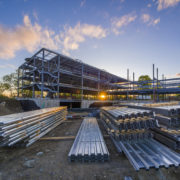The Three Biggest Dangers When Moving Steel
Erecting and moving heavy materials can be a matter of life and death.
No matter the job, big or small, every construction site presents its own challenges and dangers. But when it comes to moving heavy materials, the cost of a mistake can be a serious injury or even death. Having an experienced professional crane operator is vital for the safety of both the crew and everyone else on or near the worksite. Make sure your operator is well-versed in handling each of these three critical areas.
Load management
A crane operator must be well aware of the capabilities of the equipment he or she is using. Attempting to lift a load that is too heavy for the equipment can lead to a catastrophic accident, including the tipping of the crane. Additionally, the operator must understand load balance and how weather conditions might affect the lift. You’ve probably seen video footage of the nightmare scenario when a steel girder goes slightly off balance or gets caught in a gust of wind. The shifting weight can lead the girder to spin like a helicopter blade! An experienced operator, coupled with the right equipment for the job, will minimize the risk of accidents like these.
Falling
Naturally, one of the worst things that can happen when a crane is lifting any materials is for the load to fall. At the very least, it causes financial loss because of the damage to the material and to whatever it lands on—but you know that the risk to human life is much greater than that.
Always ensure that your crane provider utilizes properly maintained equipment that is regularly load-tested. You also need an operator who understands how to secure all shapes and sizes of heavy loads. Ask questions, and make sure you are working with a company with a full understanding of proper load handling.
Electrical hazards
The load isn’t the only thing that must be considered when utilizing a crane. Obstacles on the job site must be planned around, as well—and among the most dangerous obstacles are high-voltage power lines. If any metal part of a crane (or the load on a crane) comes in contact with a power line, it can kill not only the operator but also multiple people in the vicinity of the crane.
Analyzing a site before beginning a job and creating a safe plan is crucial. Make sure you are working with a company with experience planning for a variety of site layouts and obstructions, and get a clear understanding of the plan before the job even begins.
Safe lifts can be accomplished with the right equipment and the right operators. General Crane’s team will work with site engineers and general contractors to come up with the right plan, and our operators will provide the necessary hands-on experience to help keep everyone safe on the job site.





